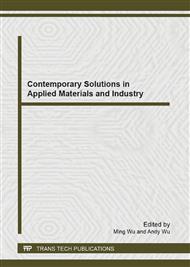p.602
p.606
p.611
p.614
p.617
p.620
p.624
p.633
p.639
Effects of Morphine Postconditioning on Myocardial Ischemia-Reperfusion Injury in Rats In Vivo
Abstract:
Objective.To investigate the effects of morphine postconditioning on Myocardial ischemia reperfusion injury in rats in vivo. Methods. To randomly divide 40 male SD rats equally into 4 groups, including Sham group in which the chest was opened without ligating the left coronary artery, ischemia-reperfusion group(Group I/R ), ischemic preconditioning group(Group IPC ) and morphine postconditioning group(GroupMOR) in which 0. 3 mg/kg morphine was given intravenously 5 min before reperfusion. The left anterior descending coronary arterys(LAD) of rats in five groups are ligated for 30 minutes and are re-perfused for 90 minutes. Cardiac Apoptosis was determined quantitatively by terminal deoxynucleotidyl transferase-mediated dUTP nick-end labeling (TUNEL) methods. To calculate the concentration of the serum malondialdehyde(MDA) with Thiobarbituric acid (TBA) reaction method and the activity of the superoxide dismutase (SOD) with xanthine oxidase reaction method. Result. Comparing with Group S, the quantity of the cardiac apoptosis in Group I/R, IPC and MOR rised in different levels. Comparing with Group 1/R, the quantity of the cardiac apoptosis in Group IPC and MOR reduced obviously. Comparing with Group 1/R, the concentration of the serum malondialdehyde (MDA) in the other four groups all reduced and the activity of the superoxide dismutase increased. Conclusion. Morphine postconditioning can significantly reduce myocardial apoptosis induced by ischemia-reperfusion injury,reduce myocardial infarct size, decrease the concentration of MDA, and increase the activity of SOD. Therefore, morphine postconditioning has protective effects on myocardial ischemia-reperfusion injury in rats in vivo. Morphine is a potent kind of opioid analgesics, which is widely used in clinical anesthesia. However, further studies are needed on effects of morphine postconditioning on myocardial ischemia reperfusion injury. In order to provide the foundations for clinical application, the authors investigate the effects of morphine postconditioning on myocardial ischemia reperfusion injury through comparison and analysis of the cardiac apoptosis, the concentration of the serum malondialdehyde (MDA) and the activity of the superoxide dismutase (SOD) in Group S, I/R, IPC and MOR.
Info:
Periodical:
Pages:
617-619
DOI:
Citation:
Online since:
April 2013
Authors:
Price:
Сopyright:
© 2013 Trans Tech Publications Ltd. All Rights Reserved
Share:
Citation:


